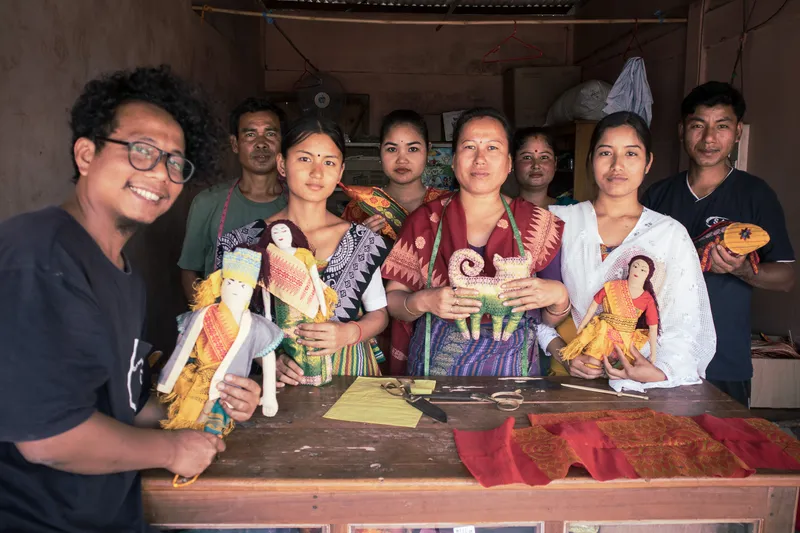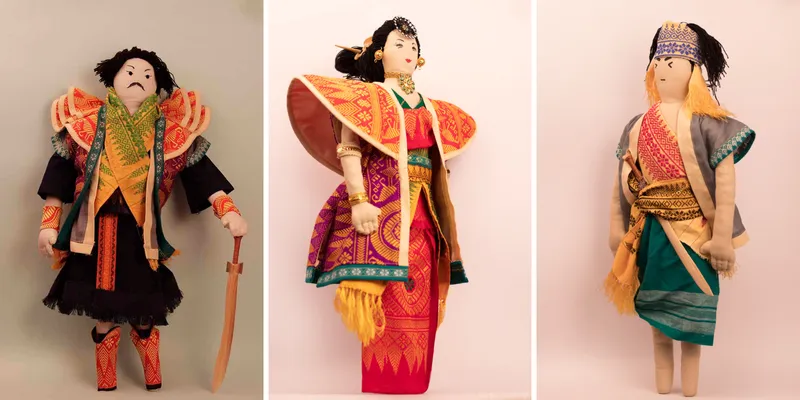How this designer from Assam is bringing Bodo tales alive with soft toys
Kirat Brahma, an NID graduate, returned to his village in Assam to start Zankla Studio, a venture that captures the essence of Bodo culture through beautifully handcrafted soft toys.
In the heart of Bodoland in Rangapani, a fringe village on the Assam-Bhutan border, Kirat Brahma grew up listening to folktales of his tribe from his grandmothers.
Years later, his attempt to bring the folklore, culture, and traditions of the Bodo tribe resulted in Zankla Studio in 2022, a creative venture that aims to preserve the rich heritage of the Northeast through beautifully hand-crafted soft toys.

The Zankla Studio team
While the studio, which is based in Assam, took shape as the Covid-19 pandemic abated, Brahma’s artistic expressions began when he was a young boy. He took to drawing and developed an interest in design as he was finishing school.
Raised in a joint family and among a tight-knit community, his roots to his heritage remained strong as he ventured out of his home state to pursue a degree at the National Institute of Design (NID) in Ahmedabad.
“While battling the perception people have of the North East, I also developed a deep love for design thinking. I understood that problems can be solved with design and my stint at NID helped me see the world with less ignorance and more mindfulness,” he tells SocialStory.
After completing his course, Brahma decided to leave the conventional 9-5 routine to join four of his friends to take up independent projects to understand the cycle of design in its entirety.
“We would work on projects for different cultures, like Arunachali folk rhymes, colouring books with NGOs, films on folktales, and also dabble in research projects,” he says.
Eventually, he joined a full-time job in design, and at the end of 2021, decided to move back to his village in Assam to work on an animation web series on his village and its people while working remotely for a firm in Bengaluru.
Recreating folktales through soft toys

The soft toys from Zankla Studio
Soon, Brahma realised that romanticising village was not the way to move forward. Traditional arts and crafts were dying with changing lifestyles.
“We were losing the folktales I used to hear from my grandmothers and essence of small details of our culture,” Brahma says.
How could he incorporate these timeless tales of the Bodos into something unique that could also provide employment to people in his village.
He asked his mother, Bharati Brahma, if she could make a soft toy depicting a character from the tribe for him.
And thus began the journey of Zankla Studio, which now boasts of over 45 handcrafted soft toys.
Juggling his Bengaluru job with a contract assignment from the US, Brahma worked day and night to bring his bootstrapped project to fruition. Adept at storytelling and the nuances of visual communication, he wanted each soft toy to feature the elements of the culture while telling its own unique story and following a design culture.
It took some time to establish this small feat of engineering design, he says with a laugh.
“Sometimes, the head would break or the neck would bend, but we persisted. Soon we had our prototypes and people loved it. I had to work with traditional weavers and women from self-help groups and some of them hadn’t even touched a needle. So, the process, though time-consuming, was an interesting one,” he adds.
Brahma speaks fondly of Raja, a team-member who was called in to make a small pouch but is now a skilled designer who cycles long distances every day to reach the studio. There’s Rani who started out as a tailor and is now the head of the team. The others are college graduates and mothers who are contributing to building something new each day. He has a team of 14 that includes artisans and others.
Storytelling is central to every soft toy that comes out of Zankla Studio. There is Thengphakhri, a Bodo freedom fighter who fought against the British; Upendranath Brahma, a Bodo social activist; Gowdang Rani, a queen, and others. The collection also includes collectibles. The soft toys are available for order through its website and Instagram page. The body of each toy is made from fibre and cotton and the clothes are woven from traditional fabric.
“Our toys are tools of cultural preservation that allow children to play and learn simultaneously. By engaging with our heritage soft toys, the younger generation connects with the stories, traditions, and craftsmanship that define our community's identity,”
Initially, Brahma sold the soft toys at events and exhibitions explaining the story behind each soft toy. Soon, he started getting orders for customised toys and corporate gifting. The toys are priced from Rs 500 onwards, but some of these sold locally are available from Rs 100 onwards.
Zankla Studio is incubated at Startup Assam and was the winner at the Rise and Shine Startup event held at Bineshwar Brahma Engineering College. Recently, it associated with Royal Enfield Social Mission and Green Hub for Red Panda and Bengal Florican endangered species conservation by making soft toys. It is also supported by WWF India for equipment resources.
Brahma is looking for grants to fund his venture. Though the project was profitable in the beginning, with the addition of more staff, it is at the break-even stage now.
“We plan to raise funds and also incorporate toys depicting tales from other tribes like Bokar in Arunachal Pradesh in the North East. We are also looking at global markets for our products,” Brahma signs off.
Edited by Megha Reddy






